#William Weightman
Text
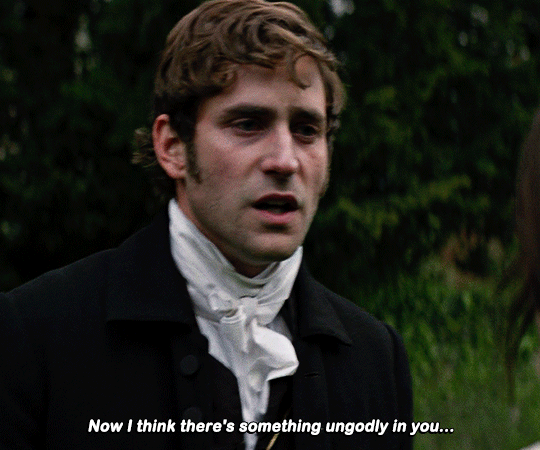
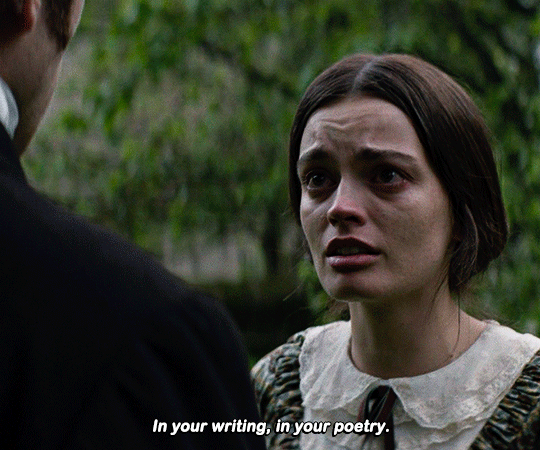
EMILY (2022) dir. Frances O'Connor
#emily#emily 2022#oliver jackson cohen#emma mackey#william weightman#emily bronte#period drama#filmedit#perioddramaedit#romanceedit#biography#drama#history#2020s#gif#constance#oh to be called ungodly by a man in a period drama piece!!!!!!!
854 notes
·
View notes
Text



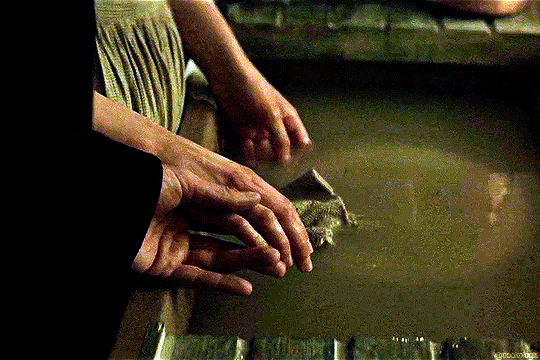


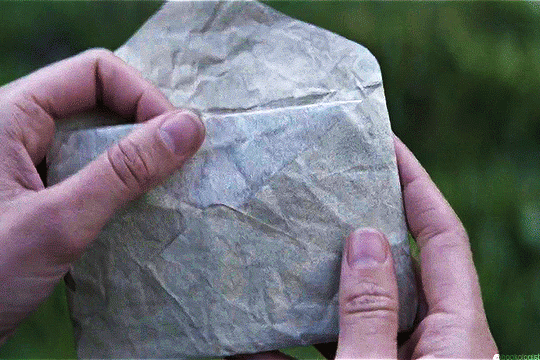

To live and to be a fool, Charlotte. How right you were.
EMILY (2022) dir. Frances O'Connor
#emily 2022#emily#emily bronte#william weightman#emma mackey#oliver jackson cohen#perioddramaedit#perioddramasource#perioddramagif#perioddramacentral#moviegifs#userstream#tvandfilmdaily#filmgifs#dailytvfilmgifs#tvandfilm#cinematv#filmedit#belltries#*bell.gifs#it was Not my intention to catch all the hands shots. it um..just happened
938 notes
·
View notes
Text
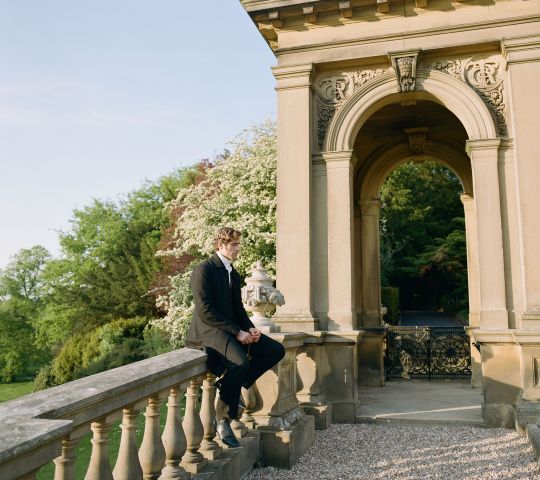
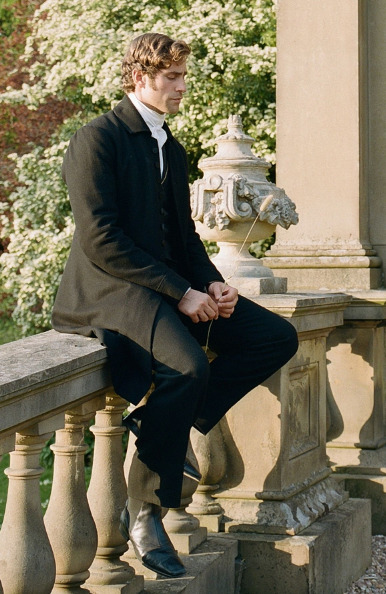
(x)
153 notes
·
View notes
Text
Some things wrong about Emily (2022)
So we watched Emily (2022) recently, and it left us feeling conflicted with a desire to explain why — spoilers below the cut.
Note: we made this list before we read the film's summary saying that it “imagines the transformative, exhilarating, and uplifting journey to womanhood of a rebel and misfit”, along with a statement acknowledging that it mixes known biographical details with imagined situations and relationships.
Anne and Emily’s close relationship is not represented (in childhood they were “like twins”, and they were inseparable companions).
The romanticisation of drug use; there are closeup shots of Emily's pupils constricting and then scenes of her frolicking on the moors with pleasant music, etc. (there is zero evidence of Emily using drugs).
Emily and William have an affair/sexual intercourse multiple times when there is no evidence of Emily ever being romantically in love with anyone (this seems to have been the main part in the “uplifting journey to womanhood”, as if a virgin in their 20s isn't already a woman; Victorian morals were thrown out the window).
William Weightman’s characterisation (on his monument it says he was “greatly respected for his orthodox principles, moral habits...”).
Wuthering Heights is written after Branwell’s death and apparently because of Emily's feelings following the death of William Weightman (her lover). The book is also not initially published under Emily's pen name Ellis Bell (it wasn't until two years after her death that it was published using her name).
The family's pets are omitted, when the siblings were all known to be animal lovers particularly Emily herself (not even one dog was shown).
The Yorkshire accents go in and out (not that this is a big problem, but if you're going to do accents, do them professionally).
The lack of display of all the sister’s writing interest and abilities, along with how they would write to supplement income.
There probably are other points that we didn't address, alas we can't think of anymore. Honestly, it’s disappointing and almost repulsive that this film is receiving positive feedback (particularly because of its female writer and director), when it clearly has many overlooked faults and anachronisms. People can say it has the loveliest cinematography, soundtrack, acting, etc., but those elements alone are not what make a film good. Based on what we know about the Brontës, we much rather recommend the film To Walk Invisible (2016) and the series The Brontës of Haworth (1973) — both are actually authentic and more historically accurate.
#emily 2022#emily (2022)#frances o'connor#emily bronte#emily brontë#charlotte bronte#anne bronte#william weightman#emma mackey#oliver jackson cohen#to walk invisible#the brontës of haworth#emily movie#twins.txt
92 notes
·
View notes
Text
And bleed she did.
ac saoeire cc nightfll / two trans rm nightfll sc labonauirs
#emily bronte#William weightman#emily 2022#fanvid#wuthering heights#emily movie#Emily#edit#emily edit#emma mackey#oliver jackson cohen
20 notes
·
View notes
Photo
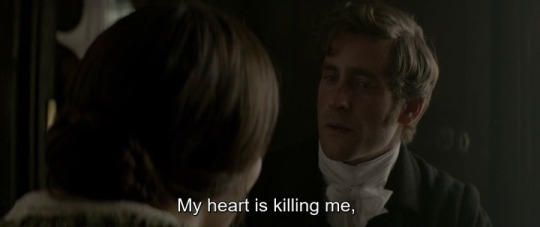
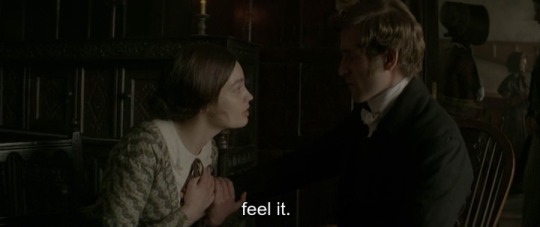
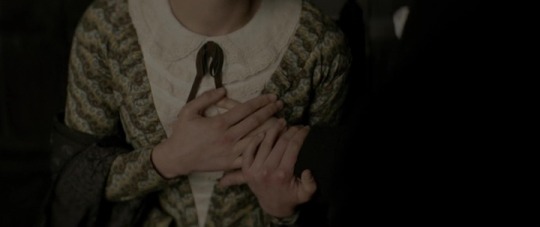
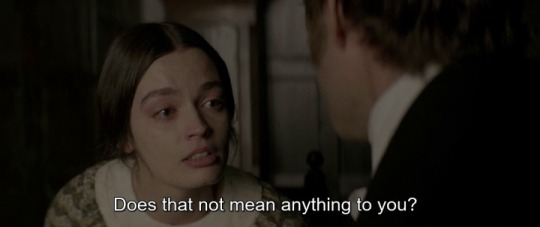
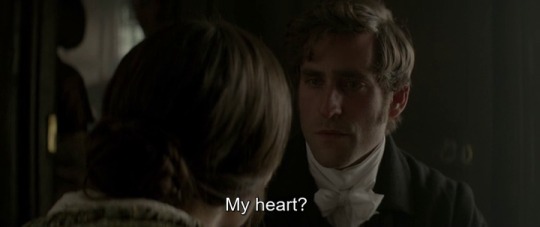
Emily (2022)
#film#movie#cinema#movie quote#film quote#movie scene#film scene#2022#emily#emily bronte#william weightman#emma mackey#oliver jackson cohen
53 notes
·
View notes
Text
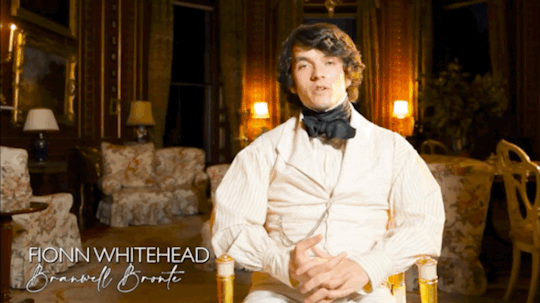
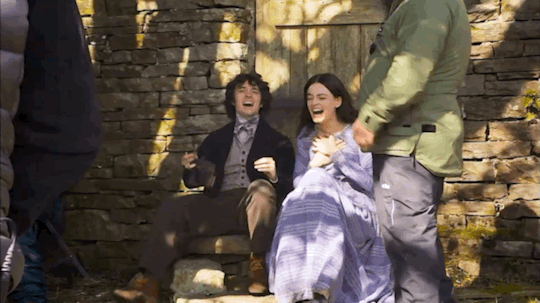
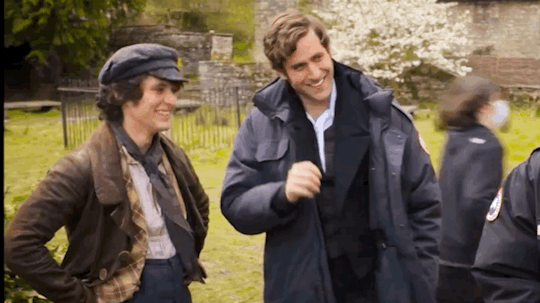
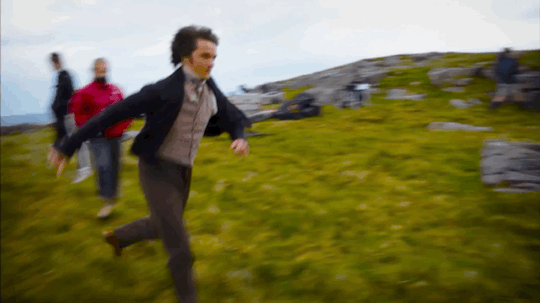
Fionn on the behind the scenes of ‘Emily’ (+)
#fionn whitehead#new content#emily (2022)#emma mackey#oliver jackson cohen#behind the scene video#my gifs#wuthering heights#branwell bronte#emily bronte#william weightman
50 notes
·
View notes
Text
i need william weightman fanfics because i am in love with oliver jackson-cohen
#william weightman#emily bronte#emily 2022#emily movie#oliver jackson cohen#emma mackey#william weightman x reader
31 notes
·
View notes
Text
youtube
Emily Brontë + William Weightman || Only The Wind
OMG when I say I was a mess that is an understatement! I really loved this story, how this was directed and just their acting of it all! This is like stuck in my head and even this edit hasn't flushed it out! I am gunna have to watch it again for the zillionth time.
So many Wuthering Heights quotes came to mind watching this film
“If all else perished, and he remained, I should still continue to be; and if all else remained, and he were annihilated, the universe would turn to a mighty stranger.”
Especially the talking of souls made me think;
“Be with me always - take any form - drive me mad! only do not leave me in this abyss, where I cannot find you! Oh, God! it is unutterable! I can not live without my life! I can not live without my soul!”
Frances O’Connor really is masterful, what a craft!
Movie: Emily (2022 film)
Couple: Emily Brontë + William Weightman
Actors: Emma Mackey + Oliver Jackson-Cohen
Song: Ólafur Arnalds - Only The Wind
#emily bronte#William Weightman#Emily x William#Emma Mackey#Oliver Jackson-Cohen#Wuthering Heights#Emily 2022#Period Drama#Period drama edit#Youtube
7 notes
·
View notes
Text
"EMILY" (2022) Review
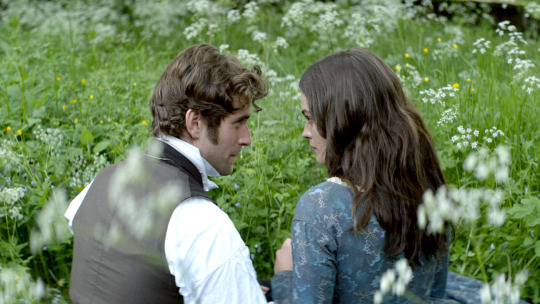
"EMILY" (2022) Review
I have been aware of only four productions that served as biopics for the Brontë family. I have seen only three of these productions, one of them being a recent movie released in theaters last year. This latest movie, the first to be written and directed by actress Frances O'Connor, is a biopic about Emily Brontë titled "EMILY".
This 2022 movie began with a question. While Emily Brontë laid dying from tuberculosis, her older sister Charlotte asks what had inspired her to write the 1847 novel, "Wuthering Heights". The story flashed back to 1839, when Charlotte returned home to the Haworth parish in West Yorkshire to visit before her graduation from school. Emily attempts to re-connect with the older sister about her fictional works, but Charlotte merely dismisses her creations as juvenile activities. Around the same time, their father Patrick, the parish's perpetual curate receives a new curate name William Weightman. While Charlotte, younger sister Anne and several young women seem enamored of the handsome newcomer, only Emily is dismissive of him. Emily accompanies Charlotte to the latter's school to learn to become a teacher and their brother Bramwell goes to study at the Royal Academy of Arts. Both Emily and Branwell return shortly to Haworth after as failures. When Branwell manages to find a job as a tutor, the Reverend Brontë charges William to provide French lessons to Emily. What began as lessons in French and religious philosophy lessons, eventually evolves into a romantic entanglement between the pair.
"EMILY" managed to garner a good deal of critical acclaim upon its release in theaters, including four nominations from the British Independent Film Awards. It also won three awards at the Dinard British Film Festival: Golden Hitchcock, Best Performance Award for leading actress Emma Mackey and the Audience Award. I have no idea how much "EMILY" had earned at the U.K. box office. But in North America (the U.S. and Canada), it earned nearly four million dollars. Regardless of this . . . did I believe "EMILY" was a good movie? Did it deserved the accolades it had received not only from film critics, but also many moviegoers?
I cannot deny that the production values for "EMILY" struck me as first-rate. I believe Steve Summersgill did a first-rate job as the film's production designer. I thought he had ably re-created Britain's West Yorkshire region during the early 1840s with contributions from Jono Moles' art direction, Cathy Featerstone's set decorations and the film's art direction. Nanu Segal's photography of the Yorkshire locations created a great deal of atmosphere with moody colors that managed to remain sharp. I found myself very impressed with Michael O'Connor's costume designs. I thought he did an excellent job in not only re-creating fashions from the end of the 1830s to the late 1840s, he also ensured that the costumes worn by the cast perfectly adhered to their professions and their class, as shown below:
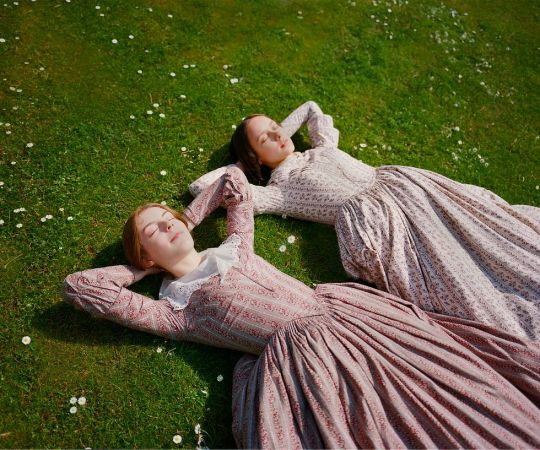
However, according to a relative of mine, Emily Brontë's fashion sense had remained stuck in the mid-to-late 1830s, something that the 2016 movie, "TO WALK INVISIBLE" had reflected. On the other hand, "EMILY" had the famous author wearing up-to-date fashion for someone of her class:
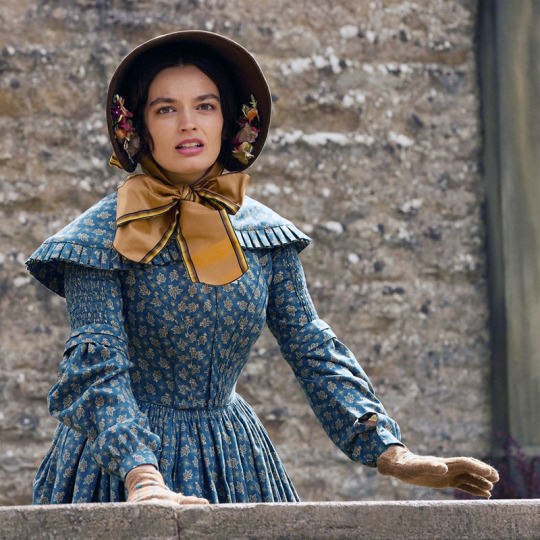
And I must admit that I found those moments featuring actress Emma Mackay wearing her hair down . . . in an era in which Western women did no such thing . . . very annoying. Otherwise, I certainly had no problems with the movie's production values. The movie also included a fascinating scene in which Emily had donned a mask and pretended to be the ghost of the Brontës' late mother during a social gathering. The scene reeked with atmosphere, emotion and good acting from the cast. I also found the scene well shot by O'Connor, who was only a first-time director.
"EMILY" also featured a first-rate cast. The movie featured solid performances from the likes of Amelia Gething as Anne Brontë, Adrian Dunbar as Patrick Brontë, Gemma Jones as the siblings' Aunt Branwell, Sacha Parkinson, Philip Desmeules, Veronica Roberts and other supporting cast member. I cannot recall a bad performance from any of them. The movie also featured some truly excellent performances. One came from Fionn Whitehead, who gave an emotional performance as the Brontë family's black sheep, who seemed overwhelmed by family pressure to succeed in a profession or the arts. Alexandra Dowling gave a subtle, yet charged performance as Charlotte Brontë, the family's oldest sibling (at the moment). Dowling did an excellent job of conveying Charlotte's perceived sense of superiority and emotional suppression. I wonder if the role of William Weightman, Reverend Brontë's curate, had been a difficult one for actor Oliver Jackson-Cohen. I could not help but notice that the role struck me as very complicated - moral, charming, intelligent, passionate and at times, hypocritical. Not only that, I believe Jackson-Cohen did an excellent job of conveying the different facets of Weightman's character. The actor also managed to create a dynamic screen chemistry with the movie's leading lady, Emma Mackey. I discovered that the actress had received a Best Actress nomination from the British Independent Film Awards and won the BAFTA Rising Star Award. If I must be honest, I believe she earned those accolades. She gave a brilliant performance as the enigmatic and emotional Emily, who struggled to maintain her sense of individuality and express her artistry, despite the lack of support from most of her family.
"EMILY" had a great deal to admire - an excellent cast led by the talented Emma Mackey, first-rate production designs, and costumes that beautifully reflected the film's setting. So . . . do I believe it still deserved the acclaim that it had received? Hmmm . . . NO. No, not really. There were two aspects of "EMILY" that led me to regard it in a lesser light. I thought it it was a piss poor biopic of Emily Brontë. I also found the nature of the whole romance between the author and William Weightman not only unoriginal, but also unnecessary. Let me explain.
As far as anyone knows, there had been no romance - sexual or otherwise - between Emily Brontë and William Weightman. There has never been any evidence that the two were ever attracted to each other, or one attracted to the other. Many have discovered that the youngest Brontë sister, Anne, had been attracted to Weightman. In fact, she had based her leading male character from her 1947 novel, "Agnes Grey", on the curate. There have been reports that Charlotte had found him attractive. But there has been no sign of any kind of connection between him and Emily. Why did Frances O'Connor conjure up this obviously fictional romance between the movie's main character and Weightman. What was the point? Did the actress-turned-writer/director found it difficult to believe that a virginal woman in her late 20s had created "Wuthering Heighs"? Did O'Connor find it difficult to accept that Emily's creation of the 1847 novel had nothing to do with a doomed romance the author may have experienced?
Despite Mackey's excellent performance, I found the portrayal of Emily Brontë exaggerated at times and almost bizarre. In this case, I have to blame O'Connor, who had not only directed this film, but wrote the screenplay. For some reason, O'Connor believed the only way to depict Brontë's free spirited nature was to have the character engage in behavior such as alcohol and opium consumption, frolicking on the moors, have the words "Freedom in thought" tattooed on one of her arms - like brother Branwell, and scaring a local family by staring into their window at night - again, with brother Branwell. This is freedom? These were signs of being a "free spirit"? Frankly, I found such activities either immature or destructive. Worse, they seemed to smack of old tropes used in old romance novels or costume melodramas. In fact, watching Emily partake both alcohol and opium reminded me of a scene in which Kate Winslet's character had lit up a cigarette in 1997's "TITANIC", in order to convey some kind of feminist sensibility. Good grief.
What made O'Connor's movie even worse was her portrayal of the rest of the Brontë family. As far as anyone knows, Reverend Brontë had never a cold parent to his children, including Emily. Emily had not only been close to Branwell, but also to Anne. And Branwell was also close to Charlotte. All three sisters had openly and closely supported each other's artistic work. Why did O'Connor villainize Charlotte, by transforming her into this cold, prissy woman barely capable of any kind of artistic expression? Why have Charlotte be inspired to write her most successful novel, "Jane Eyre", following the "success" of "Wuthering Heights", when her novel had been published two months before Emily's? Why did she reduce Anne into the family's nobody? Was it really necessary for O'Connor to drag Charlotte's character through the mud and ignore Anne, because Emily was her main protagonist? What was the damn point of this movie? Granted, there have been plenty of biopics and historical dramas that occasionally play fast and loose with the facts. But O'Connor had more or less re-wrote Emily Brontë's life into a "re-imagining" in order to . . . what? Suggest a more romantic inspiration for the creation of "Wuthering Heights"?
I have another issue with "EMILY". Namely, the so-called "romance" between Brontë and Weightman. Or the illicit nature of their romance. Why did O'Connor portray this "romance" as forbidden? A secret? I mean . . . why bother? What was it about the pair that made an open romance impossible for them? Both Brontë and Weightman came from the same class - more or less. Weightman had been in the same profession as her father. And both had been college educated. Neither Emily or Weightman had been romantically involved in or engaged to someone else. In other words, both had been free to pursue an open relationship. Both were equally intelligent. If the Weightman character had truly been in love with Emily, why not have him request permission from Reverend Brontë to court her or propose marriage to Emily? Surely as part of the cleric, he would have considered such a thing, instead of fall into a secretive and sexual relationship with her. It just seemed so unnecessary for the pair to engage in a "forbidden" or secret romance. Come to think of it, whether the film had been an Emily Brontë biopic or simply a Victorian melodrama with fictional characters, the forbidden aspect of the two leads' romance struck me as simply unnecessary.
What else can I say about "EMILY"? A rich atmosphere filled the movie. The latter featured atmospheric and beautiful images of West Yorkshire, thanks to cinematographer Nanu Segal. It possessed a first-class production design, excellent costumes that reflected the movie's 1840s setting and superb performances from a cast led by the talented Emma Mackey. I could have fully admired this film if it were not for two aspects. One, I thought it was a shoddy take on a biopic for author Emily Brontë that featured one falsehood too many. And two, I found the secretive and "forbidden" nature of Brontë's false romance with the William Weightman character very unnecessary. Pity.

#emily 2022#frances o'connor#emily bronte#bronte sisters#charlotte bronte#anne bronte#emma mackey#oliver jackson cohen#william weightman#wuthering heights#fionn whitehead#branwell bronte#adrian dunbar#gemma jones#alexandra dowling#amelia gething#sacha parkinson#philip desmeules#veronica roberts#gothic romance#period drama#period dramas#costume drama
5 notes
·
View notes
Text
Not me blushing and giggling everytime he's on screen 🤡🤡
Listen if my new pastor looked like that I'd go to Church everyday
18 notes
·
View notes
Link
William Weightman was Anne’s love interest NOT Emily’s! Emily very famously did not have a love interest (that anyone can find). There is so much historic evidence that Weightman and Anne loved each other. He’s also the inspiration for Weston in Agnes Grey. Weightman was not Heathcliff, like I’m sure they’re going to try to pull.
He’s literally described as the opposite of Heathcliff. He was a genuinely kind, caring guy; the opposite of Heathcliff, who was violent and out of control. Patrick Bronte, the sisters’ father, famously liked him and approved of him; thinking of him ‘like a son.’ Weightman would probably find Heathcliff’s character disturbing. The descriptions of Anne’s curate are much in line with a well-liked, pious, upstanding young Victorian man. Her character sketch of Weightman, Edward Weston in Agnes Grey does have appeal; he’s witty, kind towards women and animals- and most importantly he’s emotionally stable. He doesn’t play manipulative games unlike a lot of the other Bronte Heroes tend to.
Also Charlotte actually LIKED Emily’s writing, it’s Anne’s she disapproved of. She thought Emily was a genius. Charlotte did appear to be jealous of Anne not Emily whom she wanted to be compared to.
I’m studying the Brontë's now and I have done so before. I’m getting my masters in English lit. They took so many liberties with this it is not even funny!
The movie looks well done but it is inaccurate. To Walk Invisible is so much more true to what the Brontë's actually lived like. Emily was not model hot either. The sisters were plain and lived in poverty most of their lives. I’m angry that they “prettified” their life stories and changed so much. If this is historic fiction, they should clearly say so because it looks like they are trying to claim that Emily was an entirely different person than she was. Emily Bronte was not like this. She was quiet, anxious bordering on agoraphobic but also of a proud character with a brash temperament.
Another thing that they seem to get very wrong is that it was CHARLOTTE who encouraged Emily to get published not Weightman who died in 1842 of Cholera. The sisters published their first work in 1847, five years after Weightman died. In the trailer, I’m assuming that was supposed to be Charlotte putting Emily and her dream of being a writer down. Emily was pissed that Charlotte had gone through her things and read her writing. She didn’t want other people reading her work initially. She was an extremely private person!
So please know if you watch this, it is NOT the true story of the Bronte sisters by a long shot.
I’m not the only one who thinks so either:
https://miscelana.com/2022/08/12/the-emily-bronte-movie-controversy/
http://www.annebronte.org/2018/08/14/the-kind-brilliant-william-weightman-a-tribute/
https://en.wikipedia.org/wiki/Anne_Bront%C3%AB
#Emily was a weird woman not a misunderstood model#I'm pissed about this#and they're going to make Anne unimportant and Charlotte bitchy for no reason#the character of Emily looks more accurate to Anne Bronte tbh#except she'd be blonde since Anne was probably blonde they think#sorry but I'm angry#anne bronte#emily bronte#charlotte bronte#william weightman#historic fiction#the problem I have with this is people are going to see this and think it's historically accurate#I'm currently writing a grad paper on Anne Bronte's novels and MULTIPLE scources keep pointing to Weightman as inspo for Weston#sorry but it makes way more sense than him inspiring Wuthering Heights#also that's kind of insulting to assume she NEEDED a man to inspire her writing???#wuthering heights#agnes grey#the bronte sisters#19th century#please tell me they made it clear that this was an alturnate history or AU or something#Anne is getting silenced again! Not my girl!#also Weightman probably wouldn't like this either since there was evidence he also loved Anne back#her poem Farewell was famously written about his death and it appears in The Tenant of Wildfell Hall#I guess if it's about the Brontes I take it PERSONALLY#emily 2022#to walk invisible#that's an accurate depiction of their lives though Weightman isn't in that story and that one is very sad too
4 notes
·
View notes
Text
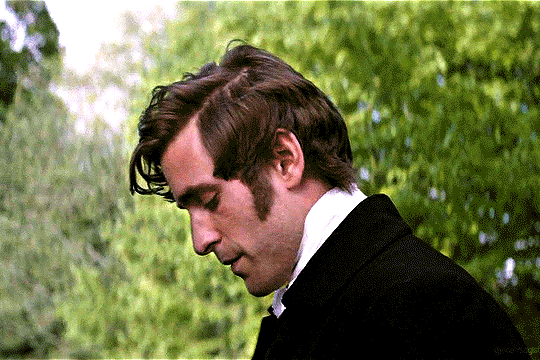
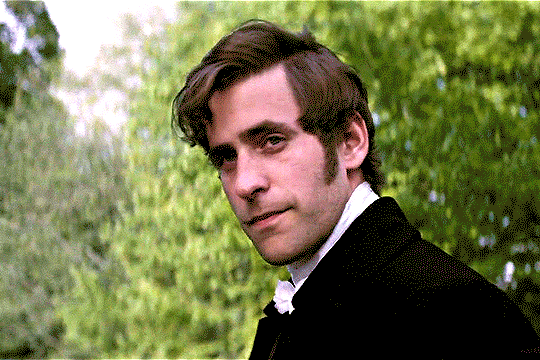
OLIVER JACKSON-COHEN as WILLIAM WEIGHTMAN in EMILY (2022)
#oliver jackson cohen#william weightman#emily#emily bronte#emily 2022#perioddramaedit#perioddramacentral#periodedit#filmgifs#filmedit#moviegifs#belltries#*bell.gifs#he's so🥺😌🤲🏽
184 notes
·
View notes
Text
cute new to us photos from leaflady89 on instagram, newly posted but from the 2022 premiere of emily at the toronto international film festival last year!
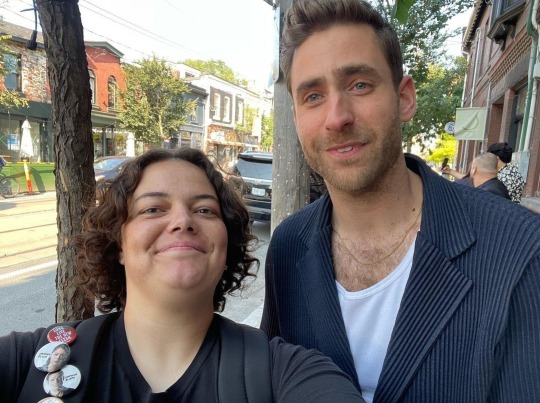
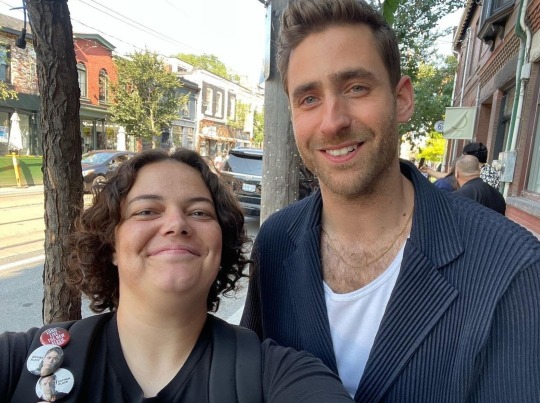

#oliver jackson-cohen#oliver jackson cohen#william weightman jr#william weightman#emily movie#emily#2022#instagram
21 notes
·
View notes
Text

Emily (2022)
🎬Imagines the transformative, exhilarating, and uplifting journey to womanhood of a rebel and a misfit, one of the world's most famous, enigmatic, and provocative writers who died too soon at the age of 30.
📝A truly magnificent, dark, poignant, moving and beautifully shot film. If you are a fan of English literature, period costume dramas then definitely check it out. The Yorkshire Moors look absolutely stunning. This is a film worth watching on the big screen.
I loved Emma Mackay in the title role as well as Oliver Jackson-Cohen as William Weightman and Fionn Whitehead as Branwell Brönte. The entire cast were great. The film also made me a bit teary too. It's really a moving story that imagines how Emily Brönte came to write Wuthering Heights.
youtube
#emily bronte#bronte sisters#branwell bronte#charlotte bronte#william weightman#yorkshire moors#emma mackey#oliver jackson cohen#fionn whitehead#adrian dunbar#gemma jones#english literature#wuthering heights#good films#english lit major#literature#movie review#film review#period costume#Youtube
5 notes
·
View notes
Text
“Anne was away from home at her job with the Robinsons at Thorp Green Hall when Weightman died, and did not come home for the funeral, but the likelihood that she had been secretly in love with Weightman is strengthened by a poem she wrote that winter, ‘I will not mourn thee, lovely one’, which expressed much more than a general loss:
‘I’ll weep no more thine early doom
But O I still must mourn -
The pleasures buried in thy tomb
For they will not return.’”
- Claire Harman, Charlotte Bronte: A Life, 2015.
5 notes
·
View notes